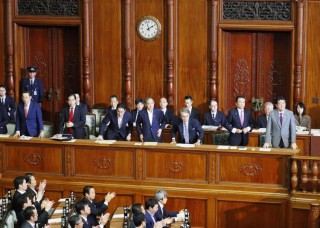Loading
Search
▼ 'Conspiracy' Law Enacted Through Rare Diet Tactic
- Category:Event
TOKYO - The Diet on Thursday enacted contentious legislation to criminalize the planning of serious crimes, which the government says will help thwart terrorism but opponents claim could lead to the suppression of civil liberties and excessive state surveillance.
The amendment to the law on organized crime cleared a vote in a plenary session of the House of Councillors, or upper house, after the ruling coalition of the Liberal Democratic Party and Komeito took the unorthodox step on Wednesday of bypassing an upper house committee vote.
The choice to circumvent the normal legislative process effectively allowed the coalition to avoid having to extend the current Diet session, set to end on Sunday, at a time when corruption allegations against Prime Minister Shinzo Abe have prompted heightened scrutiny of the Abe administration.
Opposition parties have said documents shared in the education ministry imply that Abe had a hand in a decision to approve a university project in a specially deregulated economic zone so as to benefit one of his close friends.
"Is it that you don't want (the allegations) to be covered any more than this? Is that why you've embarked on the ultimate form of railroading (by bypassing the committee)?" Democratic Party leader Renho said while speaking against the amendment.
Under the new law, members of "terrorist groups or other organized crime groups" can be punished for carrying out specific actions in preparation for 277 different crimes.
The Abe administration framed the law as an essential tool for thwarting terrorist attacks, of particular importance as Tokyo prepares to host the 2020 Olympics and Paralympics, and as necessary to allow Japan to ratify the 2000 U.N. Convention against Transnational Organized Crime.
But opponents, including legal experts, warned it could pave the way to suppression of free speech, invasive state surveillance and arbitrary punishment of civic groups and labor unions.
Opponents called it the "conspiracy bill" in a reference to three similarly worded bills that had sought to introduce a conspiracy charge. None of those bills had made it through the Diet.
Justice Minister Katsutoshi Kaneda insisted Thursday the law has been designed to dispel concerns brought up about those previous bills, as it "is expressly limited to organized criminal groups, the applicable crimes are listed and clearly defined and it applies only once actual preparatory actions have taken place."
The law serves as a fundamental shift in Japan's penal code, which previously applied penalties only after crimes had actually been committed.
Joseph Cannataci, the U.N. special rapporteur on the right to privacy, warned last month that the law could lead to undue restrictions of privacy and freedom of expression due to its potentially broad application. The Abe administration publically dismissed his concerns.
The ruling parties' tactic of bypassing a committee vote and taking a bill straight to a session of a whole Diet chamber is rarely used, while it is technically allowed.
The Democratic Party and three other opposition parties had agreed to pursue all possible means of impeding the bill.
They submitted Wednesday evening a no-confidence motion against the Abe Cabinet, which was eventually rejected in a plenary session of the House of Representatives early Thursday.
A censure motion against Justice Minister Kaneda and a motion to dismiss the head of the upper house judicial affairs committee were both voted down on Wednesday.
The struggle between ruling and opposition parties over the enactment of the law, which began Wednesday, continued throughout the night, with the final upper house vote taking place in the early morning.
A less controversial amendment bill that would strengthen the penal code's punishment of sex offenses is likely to pass a vote in an upper house committee later Thursday and be enacted in a plenary session on Friday, removing the remaining justification for an extension to the current Diet session.
The committee bypass tactic has been used four times in the lower house and 18 times in the upper house, including in June 2007, during Abe's first stint in power, to revise the law on public servants to combat the entrenched practice of bureaucrats landing post-retirement jobs in sectors they used to oversee.
© KYODO
- June 19, 2017
- Comment (0)
- Trackback(0)


